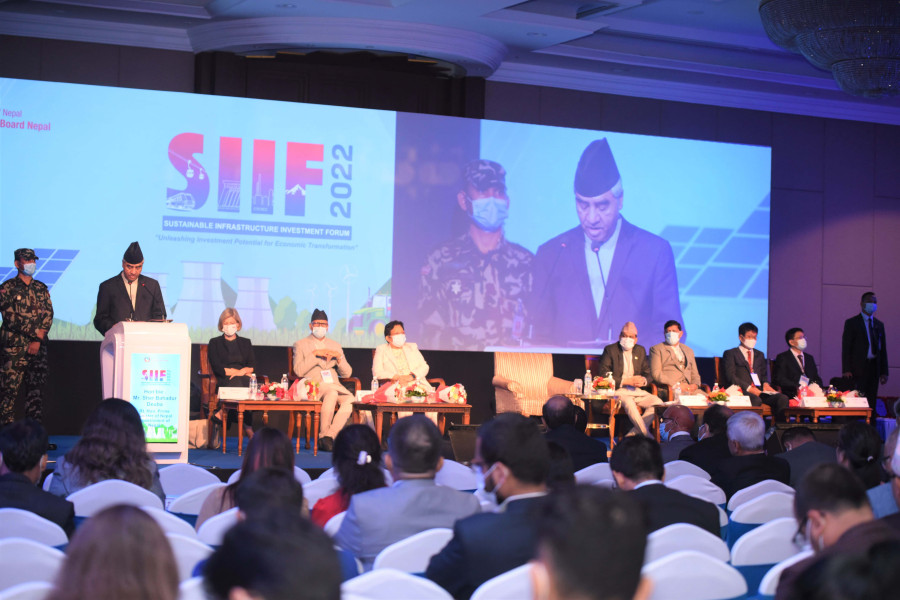Money
Net zero carbon Nepal by 2045 is easier said than done, Prime Minister Deuba says
According to the pre-pandemic estimates, the prime minister said, Nepal would require around $19 billion in financing to achieve the sustainable development goals set by the United Nations.
Post Report
Prime Minister Sher Bahadur Deuba on Wednesday said that it is easier said than done to transition the country into a net zero carbon emitter by 2045.
“We have made a national commitment to reach the scene of net zero greenhouse gas emission by 2045, however, it is easier said than done,” said Deuba, speaking at the Sustainable Infrastructure Investment Forum 2022 on Wednesday, organised by Investment Board Nepal in Kathmandu.
On November 1, 2021, speaking at the World Leaders Summit of the 26th Conference of Parties to the United Nations Framework Convention on Climate Change (COP26) in Glasgow, Scotland, Prime Minister Sher Bahadur Deuba proclaimed that Nepal aimed to reach net zero emission by 2045.
Net zero is a target of completely negating the number of greenhouse gases produced by human activity, to be achieved by reducing emissions and implementing methods of absorbing carbon dioxide from the atmosphere.
According to a report, for a country like Nepal, financial strains are major problems. Implementing measures to offset any and all carbon emissions to achieve net zero emissions would cost an estimated $43 billion over 2021‑30, which is equivalent to nearly 10 percent of GDP in average yearly financing requirement terms.
Cutting carbon emissions to net-zero and building resilience against the physical impacts of climate change is ‘Goal 13’ of the 17 UN Sustainable Development Goals.
“According to the pre-pandemic estimates, Nepal will require around $19 billion financing to achieve the development goals,” said Deuba.
“We also have plans to graduate from the LDCs category by December 2026, but the graduation will not be smooth, sustainable and irreversible without the structural transformation of our economy,” he said. “So, in this context, investment in infrastructure from the private sector and foreign investors is more important.”
Opportunities for public-private-partnership must be further explored and utilised, Investment Board said.
The board has already approved an accumulated investment of around $9 billion for 33 projects. Out of this investment, 20 are related to the development of clean energy.
Nepal needs more funds to address the increasing climate vulnerability, speakers said on Wednesday.
Despite having a minimal contribution to global carbon emission, Nepal is one of the most vulnerable countries to the effect of climate change, they said.
“In Nepal, the share of electricity in energy consumption is only 4 percent,” said Narayan Prasad Adhikari, director of the Alternative Energy Promotion Centre. “While the traditional biomass covers almost 68 percent of the consumption, the share of imported petroleum products stands at around 25 percent.”
“We need to replace the traditional biomass usage and reduce consumption of petroleum products.”
Despite the increase in electricity consumption, Nepal Electricity needs to work to provide reliable electricity, speakers said.
Though the consumption of electricity has increased in recent years, there is still a considerable demand gap, said Adhikari.
“The electricity consumption increased by 20 percent in Nepal in the last five years,” said Kulman Ghising, managing director of Nepal Electricity Authority. “Solar is complementing hydro in Nepal,” said Ghising. “We already have 54MW of solar energy and 60MW more is under construction.”
He said that the power utility has already signed a power purchase agreement for 357 projects that would generate 6,300MW of energy.
The involvement of the private sector in the infrastructure development for renewable energy usage can be instrumental, said Vishnu Prasad Agrawal, president of the Confederation of Nepalese Industries.
“Investments can be brought by involving private sectors in the development of charging stations for electric vehicles,” said Agrawal.




 9.83°C Kathmandu
9.83°C Kathmandu














